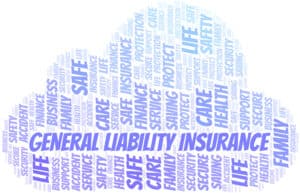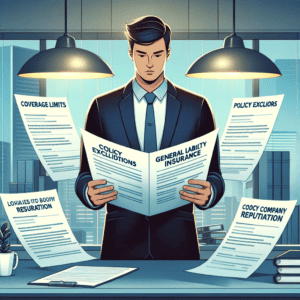
The Ultimate Guide To General Liability Insurance
General Liability Insurance is a type of insurance that provides coverage for claims made against a business or individual for bodily injury, property damage, personal injury, and advertising injury.
General liability is a crucial aspect of protecting your business from potential risks and lawsuits. As a business owner, it is essential to understand the importance of having this type of insurance coverage.
In this article, we will delve into the details of general liability insurance, its coverage, exclusions, costs, and the steps involved in filing a claim.
By the end of this article, you will have a comprehensive understanding of general liability insurance and be equipped to make informed decisions for your business.
Key Takeaways
- General Liability Insurance provides coverage for third-party bodily injury, property damage, and advertising injury claims.
- Businesses of all sizes and industries should consider purchasing General Liability Insurance to protect against potential lawsuits.
- General Liability Insurance typically covers legal fees, settlements, and judgments up to the policy limit.
- General Liability Insurance does not cover intentional acts, professional errors, or employee injuries.
- The cost of General Liability Insurance varies depending on factors such as industry, location, and coverage limits. It is important to compare quotes from multiple insurers to find the best policy for your business.
Who Needs General Liability Insurance?
CGL is essential for businesses of all sizes and industries. Any business that interacts with customers, clients, or the general public should have general liability insurance in place to protect against potential lawsuits or claims.
This includes retail stores, restaurants, contractors, consultants, and healthcare providers. In addition to businesses, individuals may also need general liability insurance.
For example, if you own rental property or have employees working in your home, you may need general liability insurance to protect against claims made by tenants or employees. Similarly, if you are a freelancer or independent contractor, having general liability insurance can provide peace of mind knowing that you are protected in the event of a claim.
What is General Liability Insurance?
General liability insurance (aka CGL) is a type of insurance policy that provides coverage for claims made against a business or individual for bodily injury, property damage, personal injury, and advertising injury.
IRMI defines it as, “General liability insurance protects commercial insureds from most liability exposures other than automobile and professional liability.” It is designed to protect businesses and individuals from financial loss in the event of a lawsuit or claim. CGL typically covers legal fees, court costs, and settlements or judgments awarded to the injured party.
There are several types of claims that are covered by general liability insurance. These include slip and fall accidents, property damage caused by the insured party, injuries caused by products or services provided by the insured party, and defamation or libel claims. General liability insurance can also provide coverage for advertising injuries, such as copyright infringement or false advertising claims.
What Does General Liability Cover?

Property Damage Caused By Tree
CGL provides coverage for a variety of claims, including property damage, bodily injury, personal injury, and advertising injury.
- Property damage coverage protects against claims made for damage to someone else’s property caused by the insured party. For example, if a contractor accidentally damages a client’s property while working on a project, general liability insurance would cover the cost of repairs or replacement.
- Bodily injury coverage protects against claims made for injuries sustained by someone else as a result of the insured party’s actions. For example, if a customer slips and falls in a retail store, general liability insurance would cover medical expenses and any legal fees associated with the claim.
- Personal injury coverage protects against claims made for non-physical injuries, such as defamation or invasion of privacy. For example, if a business owner makes false statements about a competitor in an advertisement, CGL would cover any legal fees or damages awarded to the injured party.
- Advertising injury coverage protects against claims made for injuries resulting from advertising activities, such as copyright infringement or false advertising. For example, if a business uses copyrighted material in their advertising without permission, general liability insurance would cover any legal fees or damages awarded to the copyright holder.
| What Does General Liability Insurance Cover? |
|---|
| Property damage caused by your business operations |
| Bodily injury to a third party |
| Legal defense costs |
| Personal and advertising injury |
| Medical expenses for injuries to third parties |
| Products and completed operations |
| Damage to rented premises |
| Fire damage liability |
| Reputation damage |
What Does General Liability Not Cover?
While CGL provides broad coverage for many types of claims, there are certain exclusions that are not covered by this type of policy. Intentional acts are not covered by general liability insurance. This means that if an insured party intentionally causes harm or damage to someone else, the policy will not provide coverage.
For example, if a business owner intentionally defames a competitor in an advertisement, general liability insurance would not cover any legal fees or damages awarded to the injured party. Professional services are also typically excluded from these policies. If you provide professional services, such as legal advice or medical treatment, you may need to purchase a separate professional liability insurance policy to protect against claims related to your professional services.
Employee injuries are not covered by this type of commercial insurance. If you have employees, you will need to purchase workers’ compensation insurance to provide coverage for injuries sustained by your employees while on the job.
How Much General Liability Coverage Do You Need?

General Liability Insurance Cloud
The amount of general liability insurance you need will depend on several factors, including the size and nature of your business, the industry you operate in, and the level of risk associated with your business activities.
When determining the coverage amount for your policy, it is important to consider the potential costs of a claim or lawsuit. This includes legal fees, court costs, and any settlements or judgments that may be awarded to the injured party. It is also important to consider the potential impact on your business’s reputation and future earnings.
As a general guideline, small businesses may need coverage limits of $1 million to $2 million, while larger businesses may need coverage limits of $5 million or more. However, it is important to consult with an insurance professional who can assess your specific needs and recommend an appropriate coverage amount.
How to Choose the Right Policy?
When choosing a general liability insurance policy, there are several factors to consider. These include the coverage limits, deductibles, and exclusions of the policy, as well as the reputation and financial stability of the insurance company.
- Coverage limits refer to the maximum amount that the insurance company will pay for a claim or lawsuit. It is important to choose coverage limits that are sufficient to protect your assets and future earnings.
- Deductibles are the amount that you must pay out of pocket before the insurance company will start covering costs. Higher deductibles can help lower your premiums but may also increase your out-of-pocket expenses in the event of a claim.
Exclusions are specific situations or types of claims that are not covered by the policy. It is important to review the exclusions of a policy to ensure that it provides the coverage you need. Finally, it is important to choose an insurance company that has a good reputation and is financially stable. This will ensure that the company will be able to fulfill its obligations in the event of a claim.
How to File a General Liability Insurance Claim?
If you need to file a claim, there are several steps you should take to ensure a smooth claims process:
- First, it is important to notify your insurance company as soon as possible after an incident occurs. This will allow the company to begin investigating the claim and gathering any necessary documentation or evidence.
- Next, you will need to provide the insurance company with all relevant information about the incident, including the date, time, and location of the incident, as well as any witnesses or other parties involved. You may also need to provide photographs or other evidence of the damage or injuries.
Once you have provided all necessary information, the insurance company will begin evaluating your claim and determining whether it is covered under your policy. If the claim is covered, the insurance company will work with you to resolve the claim, which may include negotiating a settlement or defending you in court.
How Can You Lower Your Premiums?

General Liability Insurance Policy Review
There are several ways to lower your liability insurance premiums and reduce your overall insurance costs.
- One way to lower your premiums is to shop around and compare quotes from multiple insurance companies. This will allow you to find the best coverage at the most affordable price. It is also important to review your coverage needs regularly and adjust your policy accordingly. As your business grows or changes, your insurance needs may change as well.
- Another way to lower your premiums is to implement risk management strategies that can help reduce the likelihood of claims or lawsuits. This may include implementing safety protocols, training employees on proper procedures, and maintaining accurate records of all business activities.
- Finally, bundling your CGL with other types of insurance, such as property insurance or workers’ compensation insurance, can often result in lower premiums. Many insurance companies offer discounts for bundling multiple policies together.
What Are Common Mistakes to Avoid?
When purchasing general liability insurance, there are several common mistakes that businesses make that can leave them underinsured or exposed to unnecessary risk.
- One common mistake is underestimating the amount of coverage needed. It is important to carefully assess your business’s risks and potential liabilities to ensure that you have adequate coverage in place. Underestimating your coverage needs can leave you vulnerable to financial loss in the event of a claim or lawsuit.
- Another common mistake is failing to review and update your policy regularly. As your business grows or changes, your insurance needs may change as well. It is important to review your policy annually and make any necessary adjustments to ensure that you have the coverage you need.
- Finally, failing to read and understand the terms and conditions of your policy can lead to unexpected surprises when it comes time to file a claim. It is important to carefully review your policy and ask questions if there is anything you do not understand.
Frequently Asked Questions:
What is general liability insurance?
General liability insurance is a type of insurance policy that provides coverage for businesses against claims of bodily injury, property damage, and other types of liability.
What does general liability cover?
General liability insurance covers a wide range of liabilities, including bodily injury, property damage, personal injury, advertising injury, and more.
Who needs general liability insurance?
Any business that interacts with customers, clients, or the public should consider getting general liability insurance. This includes small businesses, contractors, freelancers, and more.
How much does general liability cost?
The cost of general liability insurance varies depending on the size of the business, the industry, and the level of coverage needed. On average, small businesses can expect to pay between $400 and $1,500 per year for general liability insurance.
What is the difference between general liability and professional liability insurance?
General liability insurance covers claims of bodily injury, property damage, and other types of liability, while professional liability insurance covers claims of negligence or errors and omissions in professional services.
What is the claims process for general liability insurance?
The claims process for general liability insurance typically involves notifying the insurance company of the claim, providing documentation and evidence, and working with the insurance company to resolve the claim.
What are the benefits of having general liability insurance?
The benefits of having general liability insurance include protection against lawsuits and claims, peace of mind, and the ability to meet contractual requirements.
Conclusion
In conclusion, general liability insurance is an essential form of protection that provides coverage for claims made against a business or individual for bodily injury, property damage, personal injury, and advertising injury. It is important for businesses of all sizes and industries to have general liability insurance in place to protect against potential lawsuits or claims. By understanding the coverage provided by your policy, assessing your coverage needs, and choosing the right policy, you can ensure that you are adequately protected and prepared for any potential risks or liabilities.





